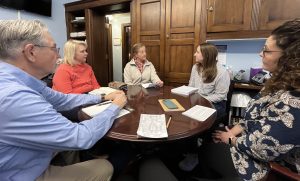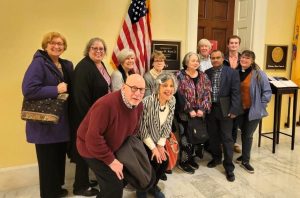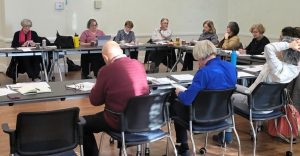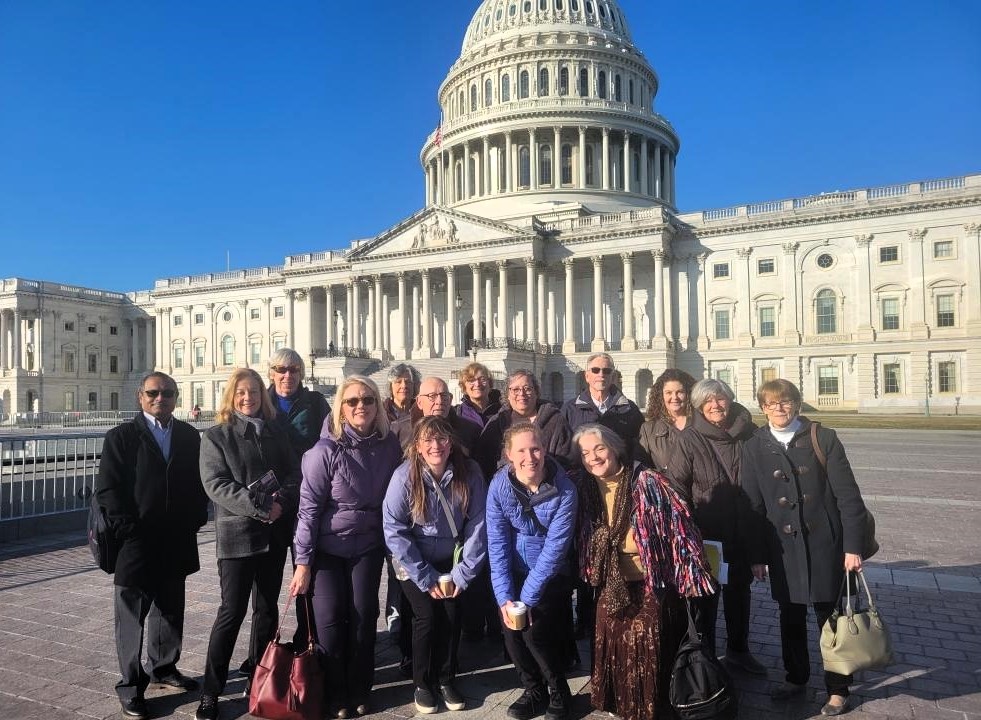Members of four Greater New Jersey churches visited the United Methodist General Board of Church & Society in Washington DC in February to inform and further deepen their commitment to confronting racial and economic injustice that afflicts poor communities with wealth inequality and food insecurity. The churches have engaged as partners in education and advocacy for two years, including joint community workshops, a sermon series, small-group studies, creation of an Advent action calendar and other efforts.
 Fifteen lay and clergy leaders of Trinity UMC in in Hackettstown, Sparta UMC, Denville Community Church (UMC) and Belvidere UMC visited GBCS February 19-21, arriving on Presidents Day, to learn from agency staff, other advocates and U.S. congressional staff. The Rev. Kathleen Stone, an educational and program consultant, organized and joined in the justice journey, which received funding support from a GNJ grant.
Fifteen lay and clergy leaders of Trinity UMC in in Hackettstown, Sparta UMC, Denville Community Church (UMC) and Belvidere UMC visited GBCS February 19-21, arriving on Presidents Day, to learn from agency staff, other advocates and U.S. congressional staff. The Rev. Kathleen Stone, an educational and program consultant, organized and joined in the justice journey, which received funding support from a GNJ grant.
Aimee Hong, GBCS’ Senior Executive Director of Education and Engagement taught the group about the federal budget and historical U.S. policies that have caused a racial wealth gap. Two other speakers, the Rev. Camille Henderson-Edwards, GBCS Director of Economic, Health and Gender Justice, and Tim Klipp-Lockhart, Government Affairs Manager of the Food Research and Action Center (FRAC), helped them understand public policies related to food justice that Congress is considering as it prepares the 2024 federal budget.
Elyssa Feder, Executive Director of Rising Organizers, taught the fledgling activists about doing grassroots organizing through one-on-one conversations, while Hong helped them prepare to advocate for food justice with state politicians.
 Team members met with staff aides of New Jersey’s Senator Bob Menendez, Representative Tom Kean and Representative Mikie Sherrill and asked them to support funding for WIC (Women with Infant Children), the Child Tax Credit and SNAP (Supplemental Nutrition Assistance Program), which is in the Farm Bill that expires September 30.
Team members met with staff aides of New Jersey’s Senator Bob Menendez, Representative Tom Kean and Representative Mikie Sherrill and asked them to support funding for WIC (Women with Infant Children), the Child Tax Credit and SNAP (Supplemental Nutrition Assistance Program), which is in the Farm Bill that expires September 30.
According to government websites, “The Special Supplemental Nutrition Program for Women, Infants and Children (WIC) provides federal grants to states for supplemental foods, health care referrals and nutrition education for low-income pregnant, breastfeeding and non-breastfeeding postpartum women, and to infants and children up to age 5 who are found to be at nutritional risk.
“The Child Tax Credit helps families with qualifying children to get a much-needed tax break… And the Supplemental Nutrition Assistance Program (SNAP) “provides food benefits to low-income families to supplement their grocery budget so they can afford the nutritious food essential to health and well-being.”
“These programs help feed millions of people of all ages and if they are cut, it will have severe consequences,” said the Rev. Heather Valosin, pastor of Denville Community Church. “We learned that Christian churches in America fill one grocery bag for every 25 grocery bags that are needed in the U.S. to address hunger. Our well-intended charity is simply not enough to meet the needs of hungry neighbors in this country. Advocating for public policies that would help them is critical in addressing the need of hunger.”
“It’s truly inspiring to see these churches actively engaged in mission partnerships and leadership development,” said the Rev. Dr. Juel Nelson, a GNJ Associate Superintendent and Director of Leadership Development, who accompanied the group and observed their learning and their advocacy on Capitol Hill. “Their preparation and meeting with congressional staff underscored their commitment to effecting change both locally and nationally.”
She commended their use of what they are learning in small-group activities, social advocacy and even worship as “evidence that they are living out their Christian faith in tangible ways that benefit their communities and the common good. They are embracing the Three Simple Rules: ‘Do Good. Do no harm. Stay in love with God.’”

“I believe my group understood food justice from a perspective they never realized existed,” said Sandy Svenningsen of Sparta UMC. She spoke of “the glaring reality of the connection between people of color, poverty and hunger in New Jersey–the high percentage of county populations living with an income 200% below the federal poverty level in a wealthy, prosperous technologically advanced region.”
“Our next step is to continue organizing with like-minded people who are passionate about food justice and share the importance of and strategy for advocating politically for food justice,” said Valosin. The churches will cosponsor their next event April 27, at 9 a.m. to noon, at Denville Community Church, where the team will describe the advocacy strategies they learned and explore additional ways to make a difference.
Read past stories about this collaborative food justice advocacy endeavor:
- GNJ churches prepare to advocate for food justice and against racism (July 26, 2023)
- Exploring Racial Equity, Food Justice to Fight Hunger (February 20, 2023)

